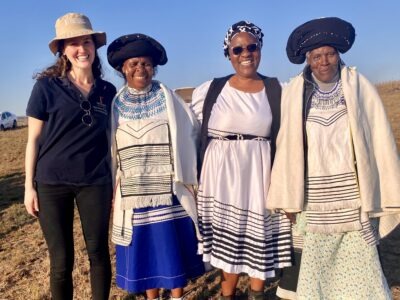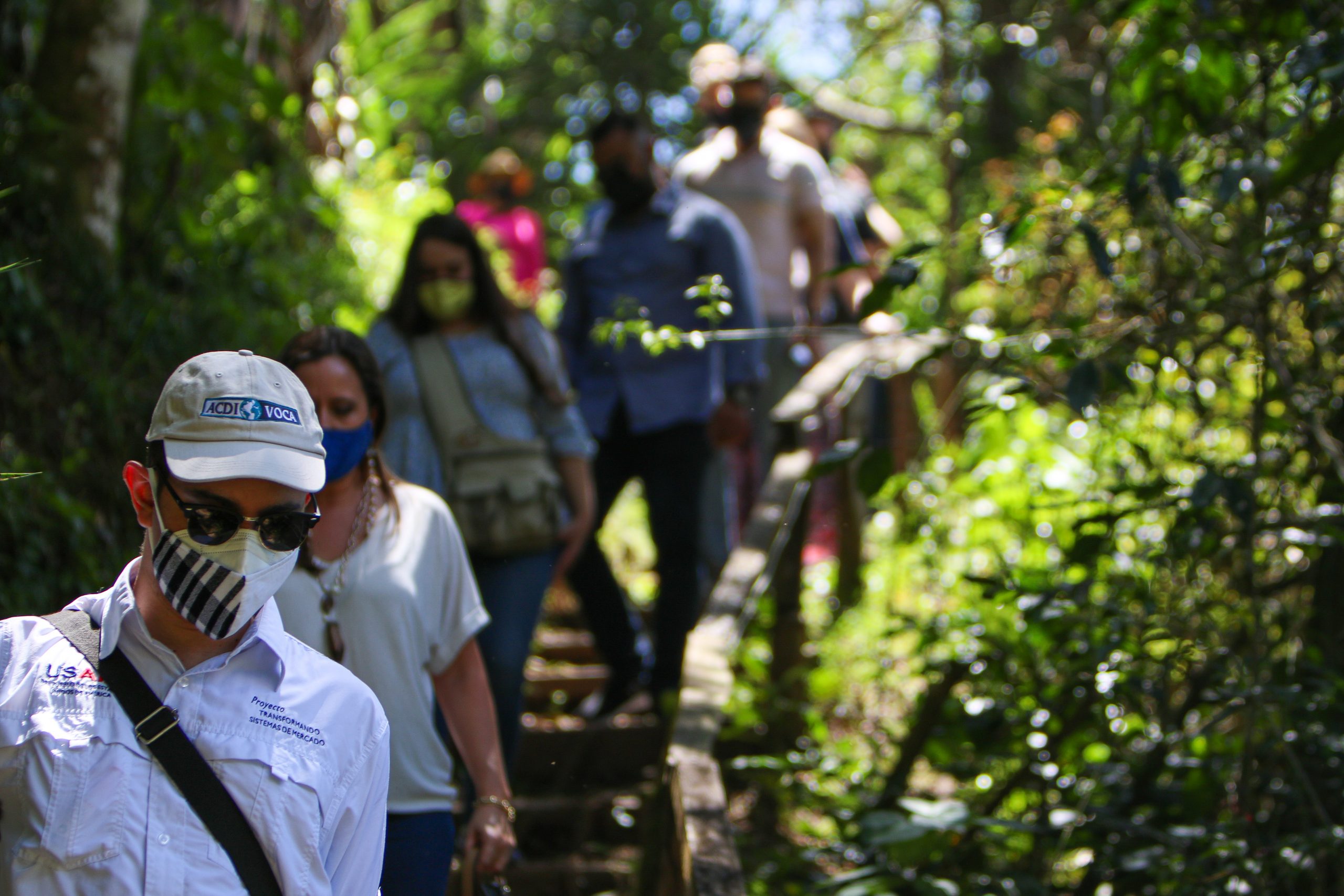
Globally, we have seen the importance of entrepreneurial ecosystems in supporting entrepreneurs to access human and financial capital and in creating an enabling environment to support the start-up and growth of enterprises. This is important as entrepreneurs create value for society by delivering new products and services and sustaining livelihoods by providing good quality, paid jobs.
In development contexts, we as change agents often face large, difficult, and seemingly intractable problems that outstrip our individual capacity to solve them.
Rather than trying to tackle each of these issues on our own, our team at the USAID/Honduras Transforming Market Systems (TMS) Activity reflected on the need to act as systems leaders to catalyze, enable, and support processes for systems change in Honduran entrepreneurial ecosystems.
“How do we lead collaboratively, build coalitions, and draw on systems insights to mobilize action across a network of Honduran ecosystem actors to better support Honduran entrepreneurs?”
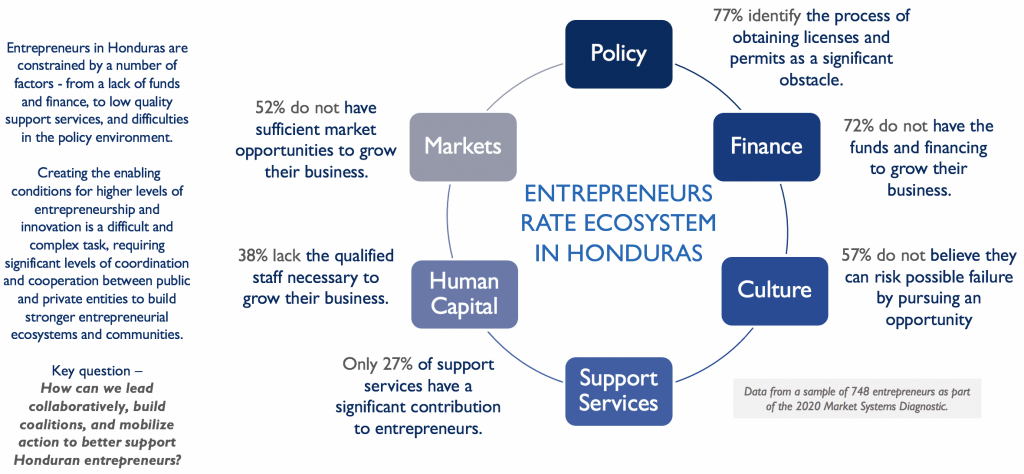
This question led us to listen, explore and co-create solutions with local ecosystem actors. Through this process, we discovered insights that we could leverage to transform the Honduran ecosystem.
Insight #1: There is an opportunity to build on and deepen collaboration between entrepreneurial support organizations so that they may better integrate and specialize their supporting services – this would expand access to new ideas, resources, and services for Honduran entrepreneurs.
A social network analysis conducted with LINC and the National Autonomous University of Honduras measured the extent of collaboration in the Honduran entrepreneurial ecosystem. This analysis found that while 70% of collaborative alliances were identified as having a significant contribution to the organizations’ mission, the network was realizing only 5% of its potential for collaboration. Further, there are a limited number of investors, accelerators, incubators, and international organizations that are supporting the Honduran entrepreneurial ecosystem.
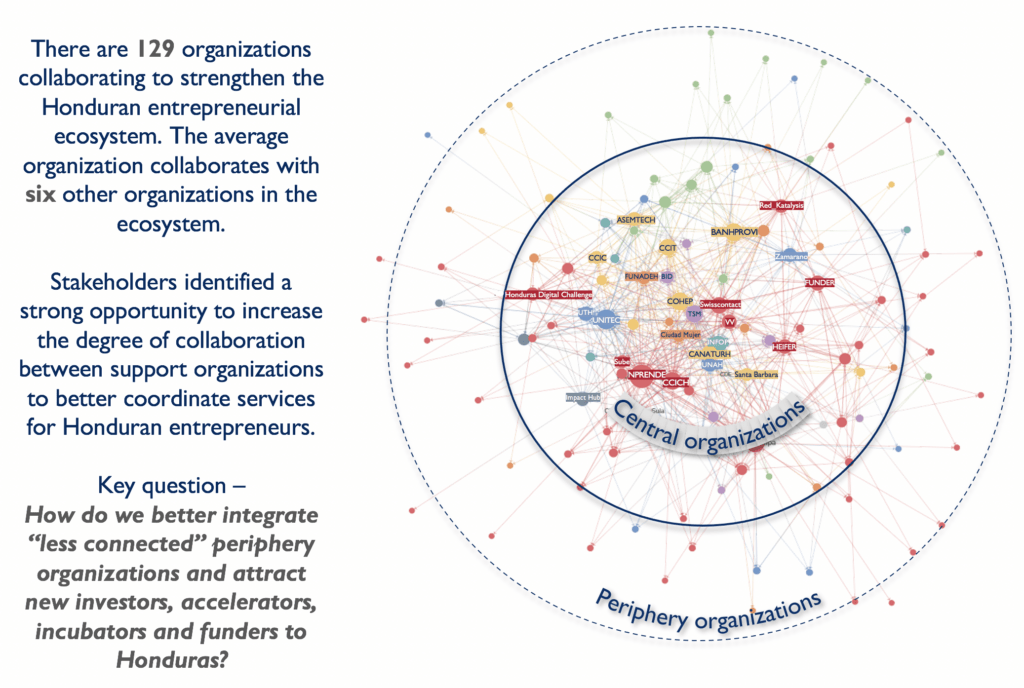
This insight served as a call to action for more than 29 international, regional, and local entrepreneurial support organizations to form the Honduran Ecosystem Builders Initiative. This initiative brings together ecosystem builders to communicate, learn from each other, and collaborate in new ways to better coordinate and expand quality services for Honduran entrepreneurs. If your organization would like to be part of the Honduran Ecosystem Builders Initiative, please send a request to LinkedIn.
Insight #2: A more dynamic ecosystem of business service providers to deliver market-based services to Honduran entrepreneurs would require a paradigm shift in their orientation to the client and in building a set of dynamic capabilities that would allow them to improve, scale, and sustain these services.
TMS in partnership with the Honduran Ministry of Small Enterprise and Entrepreneurship (SENPRENDE) and Dalberg Mexico has conducted organizational capacity assessments of 12 local business service providers to benchmark their services with industry best practice standards. This benchmarking revealed the need for a paradigm shift in strategic orientation to serve the needs of their clients better and more sustainably. This shift would require building new organizational capabilities to realize their own innate potential to innovate products and services for entrepreneurs, transform antiquated routines and practices, build strategic alliances, and learn and adapt to the changing context over time.
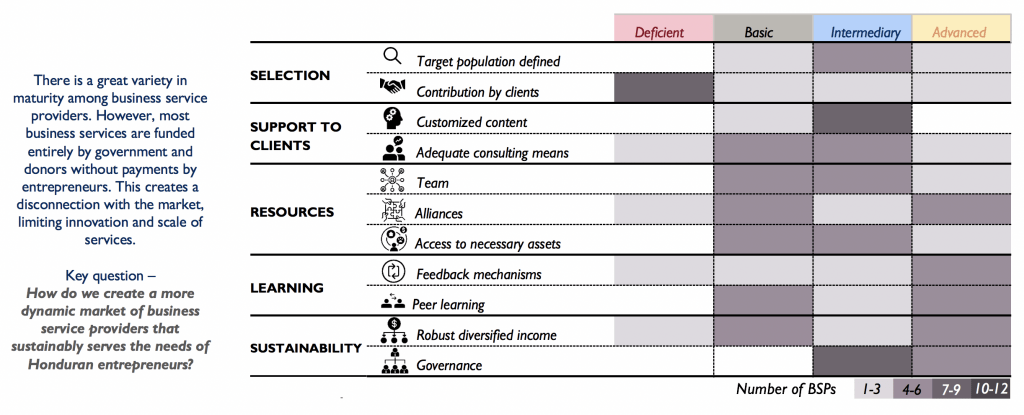
This insight informed the Ruta Honduras initiative, a national program to deliver result-based business services to high-potential entrepreneurs using best practices and standards, in alliance with the Guatemala-based entrepreneurial leader Alterna. This initiative works with 32 Honduran business service providers, strengthening their capacity to deliver quality acceleration and incubation services and uses performance-based payment mechanisms to serve the needs of 4,000 entrepreneurs.
Insight #3: Digital ecosystems in Honduras have immense potential to accelerate entrepreneurship and improve financial inclusion at scale if the binding constraints related to financial technology regulation and in development of a local marketplace of ICT service providers are addressed.
Structural analysis has revealed digitalization as a leverage point with high influence to shape long-term development outcomes. In Honduras, there have been large-scale changes in the use of social media by entrepreneurs to sell products and share information. However, the digital ecosystem in Honduras remains relatively immature and there is a noticeable absence of financial technology services.
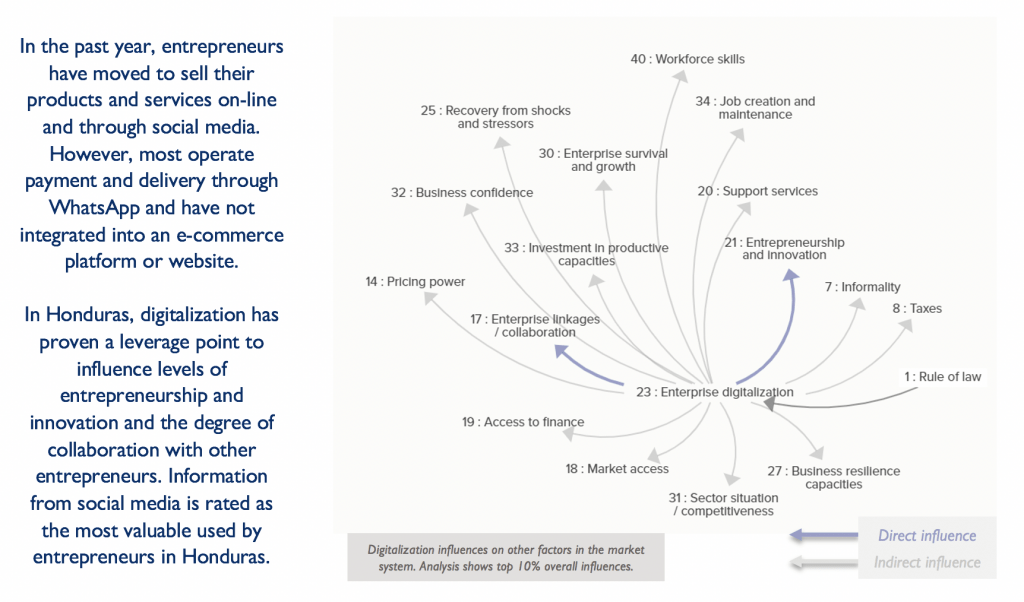
TMS partners Honduran ICT solution provider Sube Latinoamerica to address barriers to the adoption of e-commerce by entrepreneurs by developing an educational content platform (Sube Academy), sponsorship of the first year of membership, and building a network of 200 ICT consultants that specialize in website development, social media marketing, and related services. Further, TMS is working with the Central Bank of Honduras through the Financial Innovation Roundtable to reform the legal framework for electronic payments and to lower barriers to entry for new fintech solutions in Honduras.
Insight #4: Structurally, the Honduran financial sector is not able to serve the financing needs of smaller entrepreneurs. Leverage lies in attracting new funders and investors to Honduras which can meet this immediate financing need while creating a demonstration effect for local financial institutions.
A Growth Diagnostic of Honduras identified that small and women-owned enterprises report access to finance as a major constraint at a disproportionately higher rate than comparator countries. Honduran entrepreneurs try to bypass this constraint by financing investments internally or with personal credit cards. Capital needed by entrepreneurs is locked up within a conservative financial system and due to the absence of regional impact and other investors that do not perceive Honduras as a priority market.

In the past year, TMS has partnered to attract three new sources of funding for Honduran entrepreneurs including Alterna’s Catalyzer Fund, Pomona’s Impact Fund II, and the International Community Foundation (ICF) Fund. TMS is also working with banks such as Banco LAFISEto develop financial products for agriculture and women entrepreneurs through an initiative called Pyme Mujer, in collaboration with the International Finance Corporation (IFC). Much work needs to be done to unlock financing to address the scale of investment needs by Honduran entrepreneurs to support inclusion and job creation.
In the past year, TMS launched a Transaction Unit (TU) to actively pursue the crowding-in of domestic and foreign investors. The TU helps investors to identify deals and provide basic due diligence to ensure that the investors can execute deals to boost trade and increase investment in agroindustry, tourism, renewable energy, productive infrastructure, and other priority sectors.
Deepening our understanding of how we can act as effective ecosystem leaders –
This past year of listening, exploring, and co-creating solutions with partners to transform Honduran entrepreneurial ecosystems has also provided important insights on how we act as systems leaders to catalyze, enable, and support processes for systems change in Honduran entrepreneurial ecosystems.
We hope these broader reflections are useful take-aways to apply in your contexts:

In a world of solutions that don’t work in your specific context, the practice of reflection is especially important to make sense of progress, identify new connections, and take adaptive action. Over the past year alone, TMS has conducted Pause and Reflect sessions with local entrepreneurial actors. These sessions have revealed mistaken assumptions, generated breakthrough “aha” moments, spurred new action, and fostered a continuous learning-orientation between TMS and our partners.

In networks, the power-law distribution refers to when a few can have an outsized influence on the system when they act effectively as influencers, connectors, and advocates. Networks facilitate the flow of information and resources more efficiently than hierarchical structures. Too often, there is a bias by donors and NGOs to try to control activity or impose their own solutions from the top-down. TMS through co-creation has learned to take the opposite approach by supporting local entrepreneurs and support organizations to define their own problems, experiment, and innovate their own solutions.

Collaboration in an ecosystem thrives when there is a depth of trust and a sense of shared value. In order to catalyze collaboration at a network level requires that you make a commitment to engage on equal footing in an open and transparent manner and take the first step to add value freely to others without necessarily concern for reciprocity. This is a stark deviation from the more transactional way of buying collaboration. In Honduras, we are starting to see the benefits of real collaboration in the ecosystem – as it forms a type of gravity that attracts new investors, entrepreneurs, and other actors.
A Closer Look at TMS’s Work to Build Entrepreneurial Ecosystems in Honduras
Contact us:
Learn more about the USAID/Honduras Transforming Market Systems Activity.

